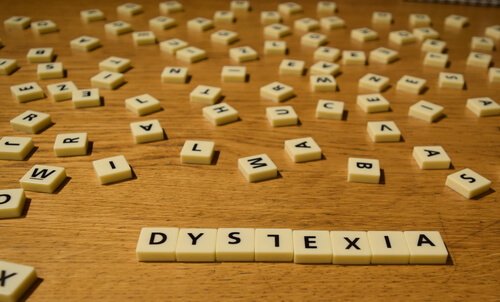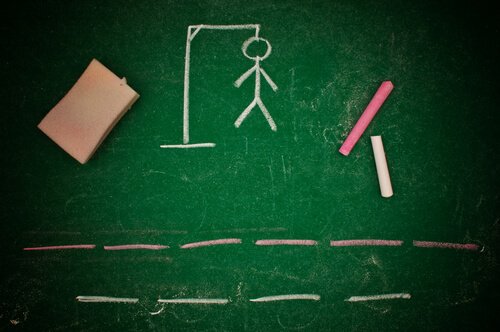4 Activities for Children With Dyslexia

With good treatment, children can usually overcome dyslexia almost completely over time. Here are some activities for children with dyslexia.
Dyslexia is a learning disorder. Professionals usually diagnose it when children are around 5 or 6 years old. It mainly affects children’s ability to read, although it can also cause issues with other skills.
There is no cure for dyslexia, which can affect children’s abilities and school performance. However, that doesn’t make it impossible to overcome, at least partially. Symptoms can be minimized by doing a series of prolonged exercises for a period of time.
This condition has a neurological origin. The area where dyslexia usually shows up is in reading, since children are unable to recognize the letters. They also can’t decode their sound, memorize them, and even less, associate them to make words.
However, by making it harder to interpret symbols, dyslexia can often show up in other areas, such as mathematics, which requires interpreting numbers and signs.
How does dyslexia affect children?
The most obvious consequence of this language disorder is school performance. Generally, children with dyslexia don’t usually meet the standards for children their age in schools.
However, they can get certain accommodations because of their difficulties. In addition, many children overcome these problems with certain activities they can do in the classroom.
“The area that dyslexia affects the most is reading.”
On the other hand, it also causes problems in children’s social lives. This is because they start to lose self-confidence. This only inhibits them and complicates their relationship with classmates, friends and teachers.
Finally, beyond the fact that dyslexia is a disorder that has nothing to do with children‘s intelligence and cognitive ability, it can really affect their self-confidence. They might feel inferior compared to their classmates.

In any case, it’s important that parents don’t let their children give up activities or feel discouraged. They should also continue having their children on a treatment plan. Over time, children can overcome this problem and continue living their life to the fullest.
4 activities for children with dyslexia
Here is a list of simple activities that help children with dyslexia make progress in their treatment:
1. Phonological awareness
This is one of the best activities for children with dyslexia. It consists of developing the ability to manipulate the sounds of language mentally.
It is a series of activities where the written part is left out. Children will only focus on the phonemes. For example: they decide if there’s a certain sound in a word, separate syllables, or replace one sound with another.
“It’s important that parents don’t let their children give up activities or feel discouraged.”
2. Search for letters or written words
You can use magazines or newspapers for this activity. Ask children to find and tell a certain letter or word that shows up frequently. This will help them distinguish them and memorize them.
In addition, you can compliment this game with other exercises. For example, they can pronounce the sound or do it as a competition. It’s a good idea to let the child “win” so that his confidence grows as he learns.

3. Word games
You can do these in a few different ways. First, you can write two similar words that only have a one-letter difference. For example: duck-buck. Then, ask him to find the difference both written and orally.
On the other hand, you can also ask him to replace a letter. This way, even if the word he formed is incorrect, he can better distinguish how sounds and words are formed.
4. Board or magazine games
The classic crosswords, alphabet soup or the famous “hangman” can be really helpful. The child can improve his phoneme identification skills.
In fact, making games to help with learning is a great idea for children with dyslexia. They can even forget that they’re doing a “task” to build their linguistic skills.
Don’t forget to get a professional consultation
Yes, these games and activities can be extremely beneficial for children with this learning condition. However, the best treatment is the one that comes from a speech pathologist.
In addition to these exercises you do at home, you can also treat dyslexia in the classroom. Teachers can ask their school specialist for specific instructions. The interdisciplinary approach is always a good idea. Undoubtedly, if you follow these steps, you will see great results with your child.
All cited sources were thoroughly reviewed by our team to ensure their quality, reliability, currency, and validity. The bibliography of this article was considered reliable and of academic or scientific accuracy.
- Alvarado, H., Damians, M., Gómez, E., Martorell, N., Salas, A., & Sancho, S. (2007). Dislexia. Detección, diagnóstico e intervención interdisciplinar. Enginy.
- Aragón, L. E. (2001). Intervención con niños disléxicos: evaluación y tratamiento. México: Trillas. http://www.trillaseduforma.com/zona-prensa/ficheros/resenas/8466541675.pdf
- Artigas-Pallarés, J. (2002). Problemas asociados a la dislexia. Revista de Neurología, 34(1), 7-13. http://ardilladigital.com/DOCUMENTOS/EDUCACION%20ESPECIAL/LOGOPEDIA/TRASTORNOS%20LENGUAJE/DISLEXIAS/Problemas%20asociados%20a%20la%20dislexia%20-%20Artigas%20-%20art.pdf
- Mondragón Barrios, L. (2007). dislexia. Salud Mental.
- PRODISLEX. (2010). Protocolos de detección y actuación en dislexia. PRODISLEX.